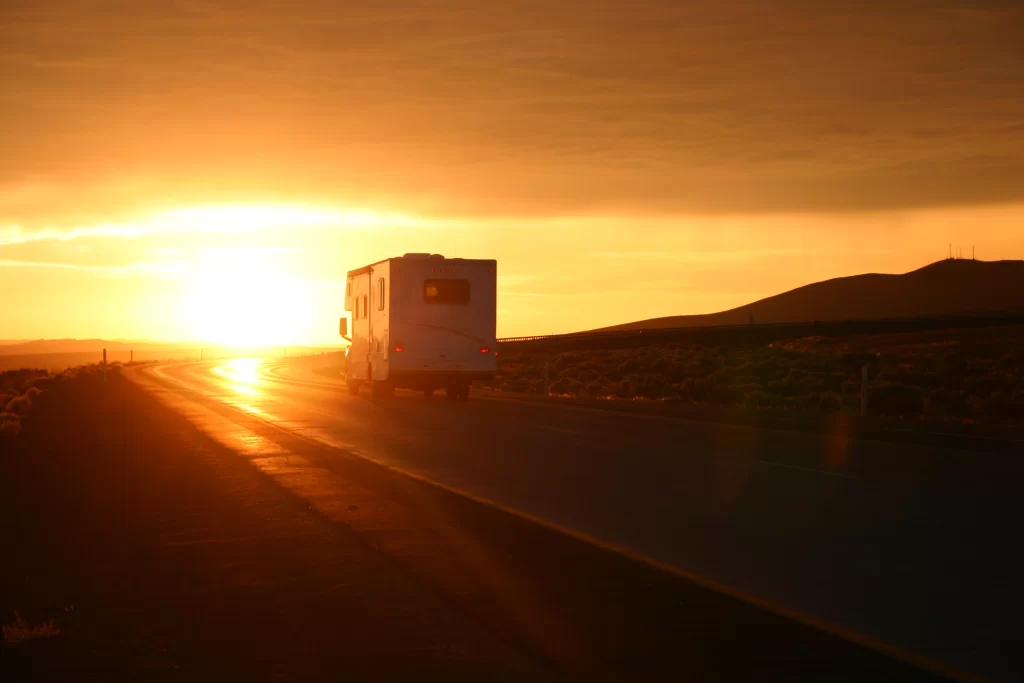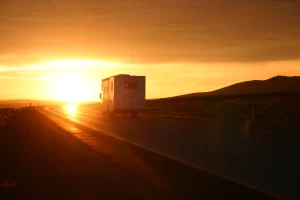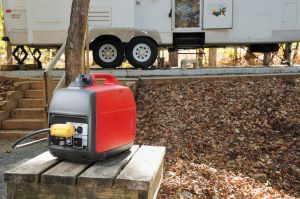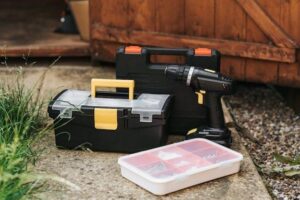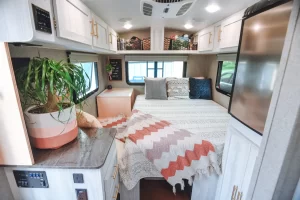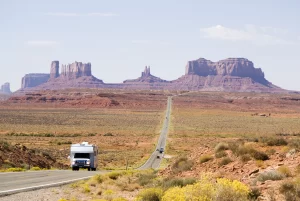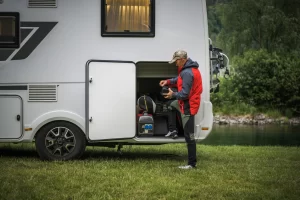
In a world filled with uncertainties, having a solid bug-out plan can be the difference between chaos and calm in major times of crisis. When considering emergency preparedness, the role of your RV as mobile sanctuaries becomes increasingly relevant.
In this guide, we will discuss how you and your RV should prepare (physically and mentally) for an apocalyptic-type natural disaster. We’ll touch on the importance of food storage in an RV for emergencies and provide practical tips on how to maximize space, plan meals, ensure food safety, and maintain inventory for long-term readiness. Whether you are a seasoned RVer or new to the lifestyle, being equipped with the right knowledge and resources can make all the difference in navigating challenging situations. So let’s dive right in…
What To Do In A Disaster Scenario?
From earthquakes to hurricanes to the inevitable robot uprising, understanding the potential threats you might face is the first step in creating a solid RV escape plan. Every region has its own set of unique risks, whether it’s blizzards in the north or wildfires in the west. Tailoring your escape-from-the-apocalypse plan to your specific location is key to being prepared. That, and not panicking. Especially if you’ve got a secure ride to take you through it.
RVs are like the Swiss Army knives of survival gear.
They offer mobility, shelter, and storage all in one cozy package––but more than that, they are like a mobile shelter on wheels, far more efficient and safer than a car, truck, or jeep. They also provide incredible storage capabilities to help keep you prepared for all the uncertainties that lie ahead. Think of your RV as your apocalypse-ready home on wheels.
Keeping Your RV Ready for Emergencies
Make sure that your RV is in top shape by conducting regular maintenance checks on essential systems such as the engine, brakes, tires, and electrical components––everything should be in working order to avoid breakdowns during critical times.
Conduct regular drills and simulations to test your apocalypse escape plan with your RV. Practice setting up camp quickly, navigating different terrains, and handling emergency scenarios to improve your readiness. After each practice session, evaluate your performance and identify areas for improvement.
Your RV should already have a number of essential items packed in advance, including band-aids, antiseptic wipes, painkillers and so on. However, having a fully stocked first aid kit and go-bag can mean the difference between a minor inconvenience and big problems. Be sure to add the following items to your must-bring RV checklist:
- Emergency gear (a ham radio, walkie-talkies, short-range radio, solar panels)
- Repair kits/tools (basics for changing a tire, hammer, screwdrivers, flashlights)
- Medical supplies, spare batteries of all sizes
- Seasonal gear (clothing, blankets, boots, headgear)
- Water and water reserves, plus tools for making rain/sea water drinkable
- Hunting tools (fishing poles, nets, guns for shooting and protection)
- Kitchen and gardening tools
- Portable cameras/video, rope, string, tripwires (for protection)
Establishing Emergency Protocols
In the chaos of an apocalypse, keeping in touch with your fellow survivors is crucial. Before the earliest signs of disaster, set up a communication plan so you can coordinate your escape efforts. Whether it’s a secret handshake or a specific radio frequency, having emergency signals and codes in place can help you communicate quickly and discreetly in hairy situations. Stock up on non-perishable food and water (more on that later), and maybe a few treats to keep you fueled up during your adventure.
Selecting Safe and Accessible Escape Destinations
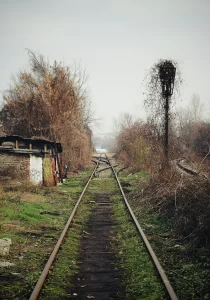
When choosing where to escape during an apocalyptic scenario, opt for locations that make sense for your surroundings. For example, in California, avoid the lowland deserts where RV breakdowns could mean danger. Instead, head for higher elevations with ample vegetation to avoid rising sea levels.
Wherever you go, prioritize spots that are safe, easily accessible, and away from densely populated areas. Consider factors like access to resources, security, and terrain suitability. Research alternate routes to your escape locations in case your primary route is blocked and always consider different scenarios and plan for contingencies to make sure you can adapt to unexpected situations.
Depending on how dangerous the situation is, you’ll likely be turning to full off-grid living––so if you have never considered yourself a resourceful, self-sufficient type, you’ll have to learn really fast. Stock up on food at a grocery store and pick up all the provisions you’ll need for (at least) a months-long solo, off-grid life.
Maximizing Space: Tips for Efficient Food Storage in an RV
When embarking on RV travels during an apocalypse, having a well-organized and efficiently stored food supply is crucial for survival.
First and foremost, you’ll want to make the most of vertical space in your RV by installing extra shelves or hanging organizers to store canned goods, spices, and snacks. Use under-the-counter storage for bulkier items like pots, pans, and larger food containers to keep your kitchen area clutter-free.
Group similar items together (e.g., grains, canned goods, snacks) and label your storage containers for easy identification. Keep frequently used items within reach and place heavier items on lower shelves to maintain stability while traveling.
Organizing Food by Categories and Accessibility
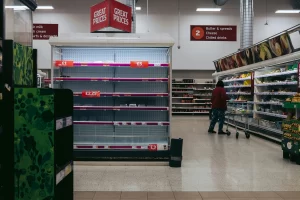
Plan meals that provide a mix of nutrients and flavors to keep your meals exciting and satisfying during the troubles. Include a variety of shelf-stable foods like grains, proteins, fruits, and vegetables to ensure a well-rounded diet.
When storing food supplies in your RV for an apocalypse, temperature control is the most important. Keep perishable items like meats and dairy in a cooler with ice packs or a portable refrigerator to maintain a safe temperature. Monitor and adjust as needed to prevent spoilage.
To extend the shelf life of your food supplies, rotate items regularly to use the oldest first. Keep track of expiration dates and consider vacuum-sealing dry goods to retain freshness and be sure to use dry and cool storage areas in your RV to maximize shelf life.
Items like canned goods, dried fruits, nuts, grains, and dehydrated meals are excellent choices for long-term storage in an RV. These foods have a longer shelf life and can provide essential nutrients during emergencies.
Be sure to have at least a two-week (and up to two-month) supply of non-perishable food per person in your RV. Consider things like the number of people traveling with you and any specific dietary needs when calculating your food storage quantities––mind you, diets might have to go out the window if/when the going gets tough.
Surviving on the Road
You’ve prepared your RV, stocked it to the gills with supplies, tools, food, and people, and you’re now heading out to greener pastures (or whatever that looks like during the end of days). And while you look for secure shelter in an off-grid environment, there may be some assets to pick up on the way.
Networking with other RV drivers
Connecting with fellow RVers to help establish a support network will be important on the road––but be wary of those who you pass by. Share information, tips, and resources to enhance your collective safety during such disasters as an apocalypse. Build relationships based on mutual aid and cooperation while collaborating with others to pool resources, knowledge, and skills. If you’ve established a network, try organizing communal meals or emergency response plans to ensure everyone’s well-being. It’ll probably be a dicey couple of months or years, so safety in numbers is good.
There you have it. A handy guide to preparing for, and surviving through, a natural disaster or apocalypse. By creating a solid escape plan that includes prioritizing essential supplies, communication protocols, and strategic decision-making, you have paved the way for a more secure future in times of uncertainty. Remember, preparation is key, and the adaptability of both your plan and your RV can be your greatest asset in navigating the unknown. Stay vigilant, stay ready, and stay safe.
